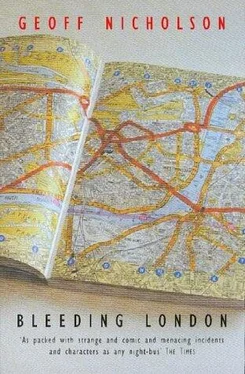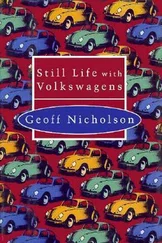The majority of these trips had to be solitary. It was generally impossible for him to persuade any of his student friends to come with him to what they called the outer limits, but he was not deterred. Sometimes he would have girlfriends and if they liked him enough they would be prepared to indulge his whims, his urge for the margins. But none of his girlfriends ever lasted very long. His longest relationship was with a girl whose parents lived in Spitalfields, and he sometimes thought the relationship only survived at all because he responded to some archaic poetry in that place-name. Being able to say he was going out with a girl from Spitalfields had, in his own mind if nowhere else, a certain glamour to it. He was profoundly disappointed when in due course he discovered that the ‘spital’ part of the name was a contraction of the word hospital and not some archaic spelling of spittle, as in saliva.
But when he had no girlfriend, and when he travelled the city alone, he never felt lonely. The city supported him, engaged him and kept him company, and he was very grateful to it.
His student years passed rapidly, and although he wasn’t a bad student, he was only interested in what he was interested in. Having abandoned English he dallied with history, then with history of art, with philosophy and anthropology. He got a degree, but only just. He wouldn’t have minded becoming an academic, but his learning was too patchy, and it was impossible to imagine what he would have researched. Instead he found himself doing a series of ‘real’ jobs; working first on a travel magazine, then for a small advertising agency, then as a technical writer for a computer firm. While all his friends seemed to conceive of themselves as over-qualified and unemployable, he found himself constantly facing a working future that promised promotion, security, responsibility, challenge.
Several years went by in this way, then one day he woke up, knew he was in absolutely the wrong place, the wrong job, the wrong industry, and decided he’d better run. He walked out of his job, moved into a much cheaper flat, lived on his meagre savings and wondered what the hell he was going to do next.
He knew that he still liked London, that he liked exploring it, walking through it. He knew he wasn’t too bad at talking to groups of people, and surprisingly he found that he quite liked foreigners. He wondered how these interests might be turned into a means of making a living.
With a recklessness and a nerve that he later found amazing, he set up a series of walking tours of London: the Architectural Walk, the Mob Walk, the Sculpture Walk. He was their only begetter. He led the tours, devised the routes, tore the tickets, made the phonecalls. He had some leaflets printed and strewed them around hotels and tourist information centres, got himself mentioned in the listings magazines, and he was only slightly surprised to find that he soon had a thriving little business, which he called Stuart’s Tours.
As anticipated, a lot of his work was with groups of American tourists. They were his best audience. His insights, his quirki-ness, his jokes, didn’t go down so well with non-English speakers, especially not the Japanese. But his youth and enthusiasm went a long way. Tourists were charmed by his manner and impressed by the depth of knowledge in one apparently so young, although at the age of twenty-six he didn’t feel young at all.
He quickly honed his skills. Those who took the tours said he was a natural communicator, that he should write a book, have his own TV show. Modestly, and accurately, he said they were wrong. Nevertheless, he could see that he was enough of a communicator to be able to make a living this way. Some seasons of the year were better than others, some years were better than others, but he soldiered on for three summers and winters, and he didn’t go broke.
He was always concerned to give value for money and he never treated his tourists with anything other than respect, but as time passed he was aware that he was losing some of his original charm. He wasn’t becoming cynical exactly, but he was getting weary.
The business was a one-man show and that made for a solitary if simple working life. But he had never been very good at the paperwork or admin and he was pleased when the business became busy enough to justify advertising for an assistant. He needed to import some organizational skills but he also needed company.
The ad must have been badly worded. He only received one reply, from an ambitious, friendly, outgoing, thoroughly business-like young woman called Anita. She had recently returned from a round-the-world trip and said she wanted to be involved in the tourist industry. She also said that she wanted to start at the bottom and work her way up. Stuart was unaware that he was at the bottom, had no idea what the way up might be, and was even more baffled when she talked in the interview about the enormous potential she saw in his business.
In the absence of competition he employed her, but she would probably have beaten most other candidates. She was obviously going to be good at the job, but what really clinched it was her name. She was called Anita Walker, a name he found as absurd as his own. It was a frivolous reason for employing someone but he never had reason to regret it. Anita could handle the accounts, could handle people, could conduct a walking tour if necessary, could do just about anything she set her mind to. Within six months she had made herself indispensable and within a year she had married the boss, not that Stuart had ever felt like her boss. She became Anita London. “A neater London.” Well, few people ever picked up on that, but her name lived on in the company’s new tide. They combined their names to become The London Walker.
Right from the beginning she told him that a business must expand or die. He didn’t particularly want it to do either, but he settled for expansion. Anita’s idea was simple enough. Instead of having one man devising and conducting all the tours, she saw that they could find any number of cheap, capable people to do the work of guiding: students, resting actors, retired academics, bored but intelligent housewives. They could be trained quickly and easily and sent on their way to do the job, creating much more work, more turnover, much bigger profits. She also suggested that some of Stuart’s tours were, how could she put it, a little recherche. Why not go for a broader market? Why not the Shakespeare Walk? The Royal Walk? The Rock ‘n’ Roll Walk? Stuart briefly objected that this was not what he’d had in mind when he started the business, but, in the face of Anita’s developing business plans and cash-flow forecasts, this was no objection at all. At the time it seemed like a risk and a diversion but he couldn’t deny that it worked.
The company progressed. There was a new office, a pool of employees, bigger and better business plans, loans, a lot of meetings with bank managers and freeholders. There were times when it all looked very precarious indeed but at the end of each year the accountants, who never appeared to have had any confidence whatsoever in the enterprise, declared that The London Walker was doing surprisingly well.
Meetings with bank managers and accountants were still not Stuart’s forte, however. At first he continued to lead walks. But Anita had been right. His knowledge of London was detailed and profound, his love of it real, yet as the years went by he had an increasing distaste for the obvious. He genuinely wanted to reveal London to the people who came on the tours but he was bored with its more obvious features. He wanted to show its eccentricities and unknown quarters. Rather than take them to the Tower of London he’d have preferred to take them to the abandoned Severndroog Castle near Oxleas Wood. For Stuart it increasingly wasn’t enough to tell a few old anecdotes and point out a few sights and locations. He felt that truth was more profound in the obscure corners than in the grand sweeps. And on a good day he would find these corners, even while ostensibly showing punters the more orthodox aspects of London. His tours became increasingly abstract, free form, improvised, often turning into a sort of mystery tour. A crowd that had signed up for a canal walk might be treated instead to a tour of sites connected with leprosy. There were a few complaints, some dissatisfied walkers who demanded their money back.
Читать дальше












